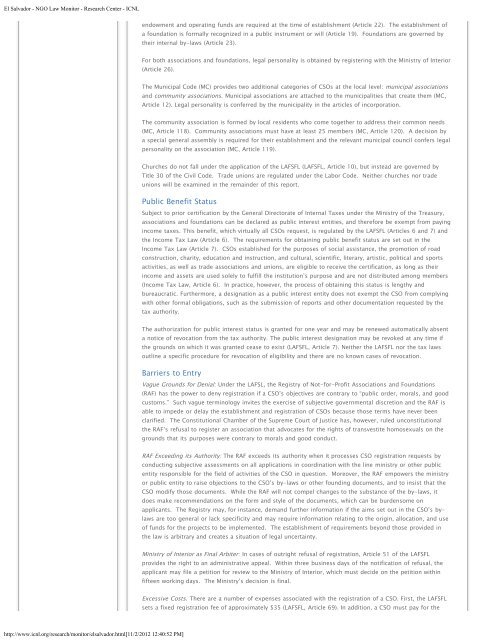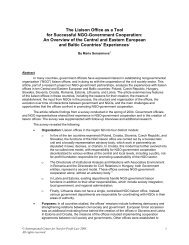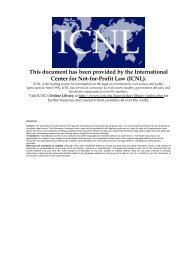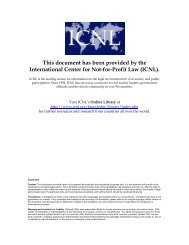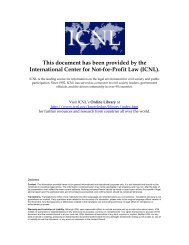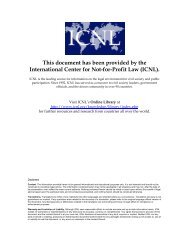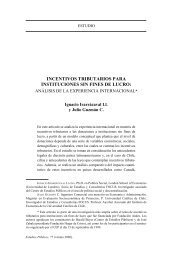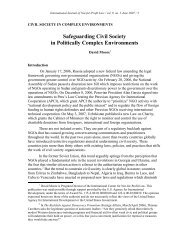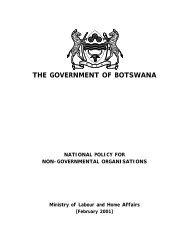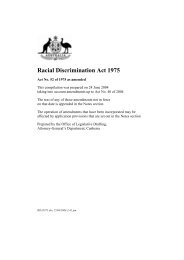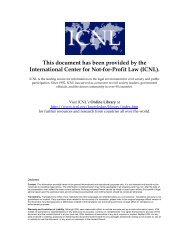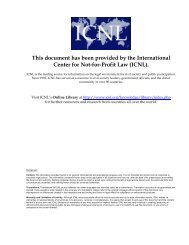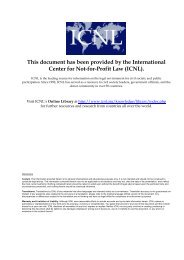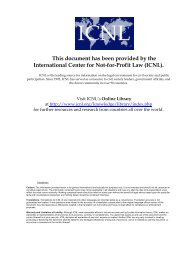El Salvador - NGO Law Monitor - Research Center - ICNL
El Salvador - NGO Law Monitor - Research Center - ICNL
El Salvador - NGO Law Monitor - Research Center - ICNL
Create successful ePaper yourself
Turn your PDF publications into a flip-book with our unique Google optimized e-Paper software.
<strong>El</strong> <strong>Salvador</strong> - <strong>NGO</strong> <strong>Law</strong> <strong>Monitor</strong> - <strong>Research</strong> <strong>Center</strong> - <strong>ICNL</strong><br />
http://www.icnl.org/research/monitor/elsalvador.html[11/2/2012 12:40:52 PM]<br />
endowment and operating funds are required at the time of establishment (Article 22). The establishment of<br />
a foundation is formally recognized in a public instrument or will (Article 19). Foundations are governed by<br />
their internal by-laws (Article 23).<br />
For both associations and foundations, legal personality is obtained by registering with the Ministry of Interior<br />
(Article 26).<br />
The Municipal Code (MC) provides two additional categories of CSOs at the local level: municipal associations<br />
and community associations. Municipal associations are attached to the municipalities that create them (MC,<br />
Article 12). Legal personality is conferred by the municipality in the articles of incorporation.<br />
The community association is formed by local residents who come together to address their common needs<br />
(MC, Article 118). Community associations must have at least 25 members (MC, Article 120). A decision by<br />
a special general assembly is required for their establishment and the relevant municipal council confers legal<br />
personality on the association (MC, Article 119).<br />
Churches do not fall under the application of the LAFSFL (LAFSFL, Article 10), but instead are governed by<br />
Title 30 of the Civil Code. Trade unions are regulated under the Labor Code. Neither churches nor trade<br />
unions will be examined in the remainder of this report.<br />
Public Benefit Status<br />
Subject to prior certification by the General Directorate of Internal Taxes under the Ministry of the Treasury,<br />
associations and foundations can be declared as public interest entities, and therefore be exempt from paying<br />
income taxes. This benefit, which virtually all CSOs request, is regulated by the LAFSFL (Articles 6 and 7) and<br />
the Income Tax <strong>Law</strong> (Article 6). The requirements for obtaining public benefit status are set out in the<br />
Income Tax <strong>Law</strong> (Article 7). CSOs established for the purposes of social assistance, the promotion of road<br />
construction, charity, education and instruction, and cultural, scientific, literary, artistic, political and sports<br />
activities, as well as trade associations and unions, are eligible to receive the certification, as long as their<br />
income and assets are used solely to fulfill the institution’s purpose and are not distributed among members<br />
(Income Tax <strong>Law</strong>, Article 6). In practice, however, the process of obtaining this status is lengthy and<br />
bureaucratic. Furthermore, a designation as a public interest entity does not exempt the CSO from complying<br />
with other formal obligations, such as the submission of reports and other documentation requested by the<br />
tax authority.<br />
The authorization for public interest status is granted for one year and may be renewed automatically absent<br />
a notice of revocation from the tax authority. The public interest designation may be revoked at any time if<br />
the grounds on which it was granted cease to exist (LAFSFL, Article 7). Neither the LAFSFL nor the tax laws<br />
outline a specific procedure for revocation of eligibility and there are no known cases of revocation.<br />
Barriers to Entry<br />
Vague Grounds for Denial: Under the LAFSL, the Registry of Not-for-Profit Associations and Foundations<br />
(RAF) has the power to deny registration if a CSO’s objectives are contrary to “public order, morals, and good<br />
customs.” Such vague terminology invites the exercise of subjective governmental discretion and the RAF is<br />
able to impede or delay the establishment and registration of CSOs because those terms have never been<br />
clarified. The Constitutional Chamber of the Supreme Court of Justice has, however, ruled unconstitutional<br />
the RAF’s refusal to register an association that advocates for the rights of transvestite homosexuals on the<br />
grounds that its purposes were contrary to morals and good conduct.<br />
RAF Exceeding its Authority: The RAF exceeds its authority when it processes CSO registration requests by<br />
conducting subjective assessments on all applications in coordination with the line ministry or other public<br />
entity responsible for the field of activities of the CSO in question. Moreover, the RAF empowers the ministry<br />
or public entity to raise objections to the CSO’s by-laws or other founding documents, and to insist that the<br />
CSO modify those documents. While the RAF will not compel changes to the substance of the by-laws, it<br />
does make recommendations on the form and style of the documents, which can be burdensome on<br />
applicants. The Registry may, for instance, demand further information if the aims set out in the CSO’s bylaws<br />
are too general or lack specificity and may require information relating to the origin, allocation, and use<br />
of funds for the projects to be implemented. The establishment of requirements beyond those provided in<br />
the law is arbitrary and creates a situation of legal uncertainty.<br />
Ministry of Interior as Final Arbiter: In cases of outright refusal of registration, Article 51 of the LAFSFL<br />
provides the right to an administrative appeal. Within three business days of the notification of refusal, the<br />
applicant may file a petition for review to the Ministry of Interior, which must decide on the petition within<br />
fifteen working days. The Ministry’s decision is final.<br />
Excessive Costs. There are a number of expenses associated with the registration of a CSO. First, the LAFSFL<br />
sets a fixed registration fee of approximately $35 (LAFSFL, Article 69). In addition, a CSO must pay for the


